
Indhold
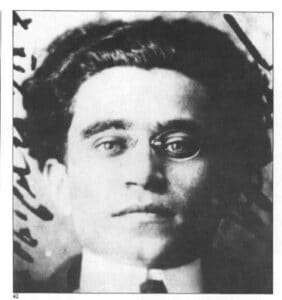
På dansk
In English
På dansk (og svensk)
Leksikalt og sites
- Gramsci, Antonio (Leksikon.org)
- Antonia Gramsci (Wikipedia.no). Norsk leksikal med link til længere engelske.
- Antonio Gramsci 1891-1937 (Marxists Internet Archive: Dansk Afdeling). Tekster af Gramsci på dansk.
- Antonio Gramsci (Marxisme online). Lidt flere tekster af Gramsci på dansk.
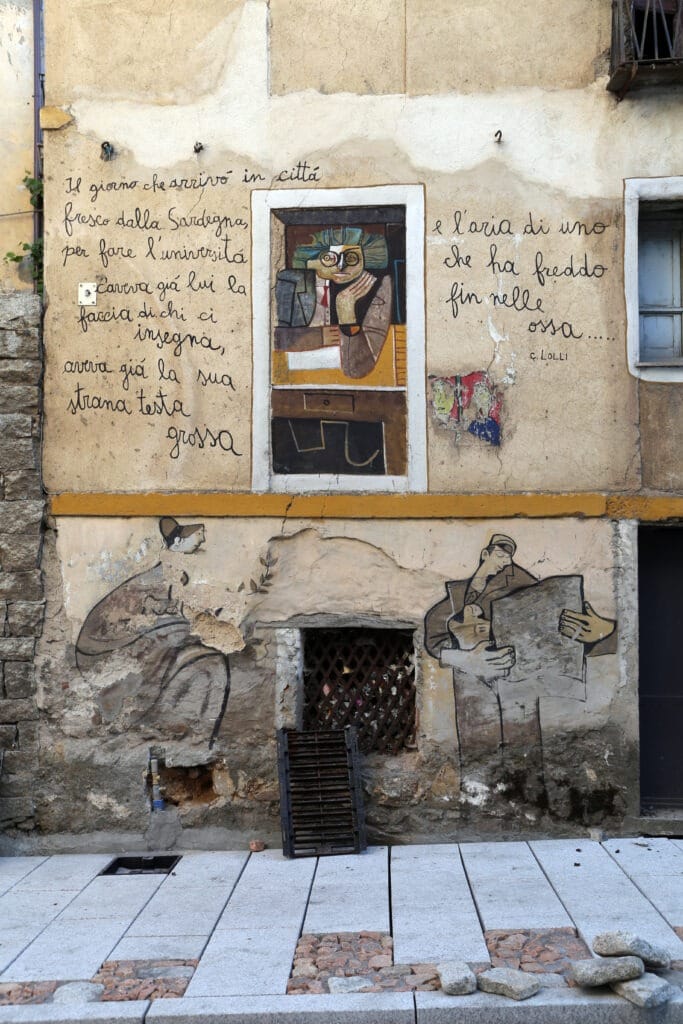
Artikler
Marxisten man kunne invitere med hjem til sin mor. Af Carsten Jensen (Solidaritet.dk, 26. oktober 2021)
“Han ville opbygge et masseparti, der kunne arbejde inden for parlamentariske rammer. Som optakt til Selskabet for Arbejderhistories festival på lørdag, skriver Carsten Jensen om Antonio Gramsci, der var med til at opbygge det italienske kommunistparti, men døde i fængsel efter fascisternes magtovertagelse.”
Se replik fra Alfred Lang: Antonio Gramsci, Amadeo Bordiga og lokalvalget i Italien (Ibid., 2. november 2021). “Koblingen mellem de nyligt overståede lokalvalg og Gramsci’s revolutionære politik virker misvisende i en ellers god og informativ artikel.”
Gramsci kendte hverken til velfærdsstat eller klimakrise. Af Carsten Jensen (Solidaritet.dk, 22. november 2020)
“Velfærdsstaten, de nye demokratiske krav og klimakrisen var ikke på Gramscis dagsorden. Læs og brug ham derfor ud fra nutidens sammenhæng.”
De venstreorienterede, magten og klimakrisen: Om Antonio Gramscis politiske aktualitet (Solidaritet.dk, 24. juni 2020)
“Det kan godt være, det ikke er populært på venstrefløjen at snakke om, at man ‘ønsker magt over andre’. Det bliver man dog nødt til at komme sig over, hvis man vil udrette noget på klimaspørgsmålet, mener Carsten Jensen. Han peger på den italienske filosof, Antonio Gramsci som et godt sted at studere det spørgsmål.”
Gramsci er vaccine mod et sygt system. Af Lars Henrik Carlskov (Socialistisk Arbejderavis, nr.380, 25. maj 2020)
“Nutidens aktivister kan lære af Antonio Gramscis idéer om vejen fra protest til social revolution.”
Bevar roen og læs Gramsci. Af Carsten Jensen (Kritisk Debat, 15. juni 2018; online på Internet Archive)
“En kommenteret reportage fra en udstilling af originalerne til Antonio Gramscis Fængselsoptegnelser og et oplæg af arbejderhistorikeren Donald Sassoon på det italienske kulturinstitut i London, december 2017.”
Kulturelt hegemoni og postdemokrati (pdf). Af Gert Sørensen (Dkp.dk). Oplæg på Marxismekonference (9. september 2017, 7 s.)
“Man finder dog ikke hos Gramsci en udbygget teori om demokratiet. Hvad han lægger vægt på, er, at det er en styreform, der sikrer en større grad af social mobilitet og deltagelse nedefra og dermed også en større og hyppigere udskiftning af ‘de ledende grupper’.”
Antonio Gramsci: liv og værk (pdf). Af Claus Bryld (Kritisk Debat, 15. april 2016, 11 s.; online på RUC)
“Som tænker bevægede Gramsci sig frit mellem republikaneren Niccolo Macchiavelli, socialisten Karl Marx og den liberale italienske filosof Benedetto Croce. På dette grundlag udformede han sin særlige ‘praxisfilosofi’ og sin særlige politikopfattelse, der vender sig mod eliternes indbyggede tendens til magtfudkommenhed.”
Se også Claus Bryld: Antonio Gramsci: set i dansk og international kontekst (pdf) (Ibid, 15. december 2016; online på RUC).
Tema om Antonio Gramsci (Kritisk Debat, 2016). P.t. ikke online.
Med artikler af Claus Bryld, Bjarke Skærlund Risager, Óscar García Agustín og Martin Bak Jørgensen, Gert Sørensen, Jan Helbak, Carsten Jensen.
Antonio Gramsci – ikke kun for begyndere. Af David Helin (Solidaritet, nr.3, december 1998, s.10-16; online på Internet Archive)
“Antonio Gramsci anses som tilhørende rækken af de betydeligste marxistiske og socialistiske teoretikere, og måske den største siden Lenin. Han udgør ihvertfald efter min mening et meget vigtigt supplement til Marx, Engels og Lenin …”
Antonio Gramsci – hvad kan vi lære? Af Mette Moltke (International Socialisme, nr. 1, februar 1992, s.33-36; online på Socialister.dk)
“I 100-året for Antonio Gramscis fødsel udkom på dansk et udvalg af den italienske revolutionæres fængselsoptegnelser. Bogen er et vigtigt bidrag for enhver, der vil forstå historien og marxismens teoretiske fundament.”
Antonio Gramsci’s fængselsoptegnelser: En befriet marxisme. Af Karsten Ditlevsen (Giraffen, nr.5, 1991, s.26-28; online på Modkraft.dk)
“Gramsci’s ‘praksisfilosofi’ beskæftiger sig med mennesket i historien. Hans tanker er derfor et frontalt opgør med stalinismens dogmatisering af marxismen, skriver Karsten Ditlevsen i denne introduktion til Gramsci’s ‘Fængselsoptegnelser’.”
Antonio Gramscis ‘praksis-filosofi’ (pdf). Af Jens Hoff (Politica, årg.20, nr.3, 1988, s.330-346)
“I denne artikel søges det påvist, at Gramsci er den ‘klassiske’ marxistiske tænker, som på det teoretiske plan er mest konsekvent og mest original i analysen ‘samfundsmæssig praksis’.”
Antonio Gramsci – en politisk biografi (pdf). Av Quintin Hoare (Lund, Arkiv, 1983, 116 s.; online på Marxistarkiv.se, 10. april 2018)
“En kortfattad men fyllig biografi över Gramscis politiska bana – från de politiska ungdomsåren i Turin kring första världskriget, över perioden som ledare för det italienska kommunistpartiet och fram till tiden i Mussolinis fängelser 1926–37.”
Motsägelser hos Antonio Gramsci (pdf). Av Perry Anderson (Marxistarkiv.se, august 2018, 90 s.)
Artikel ur New Left Review (nr.100, november-december 1976, s.5-78) (i nyutgåva 2017), där Anderson diskuterar Gramscis hegemonibegrepp, och de motsägelser Anderson ser i Gramscis texter.”
In English
Biographies & sites
Antonio Gramsci (Marxists Internet Archive)
Gramsci’s life and thought – Pre-Prison political writings 1910-1926 – Prison Notebooks 1929-1935 – Collections of Gramsci’s writings.
Gramsci Links Archive
Page designed & maintained by Marcus Green, 2014 (online at Internet Archive).
Links to biography, to Gramsci’s writings (on-line), articles on Gramsci & his ideas, analyses of rightwing uses & interpretations of Gramsci, rightwing & religious interpretations of Gramsci, links to Gramsci sites, etc.
International Gramsci Society
Biography – Chronology – Photo Archive – Articles & Reports – Gramsci Bibliography – Pre-Prison Index – Prison Notebooks – Audio and Video.
incl.: International Gramsci Journal
Antonio Gramsci (Wikipedia.org)
En del om fængselsophold under kapitel 1: Life. Også mange links.
Tema: Antonio Gramsci (Internationale Socialister)
Tekster om Gramsci på engelsk (og dansk).
Tema: Antonio Gramsci (Workers Liberty, 2010)
Tekster om Gramsci på engelsk.
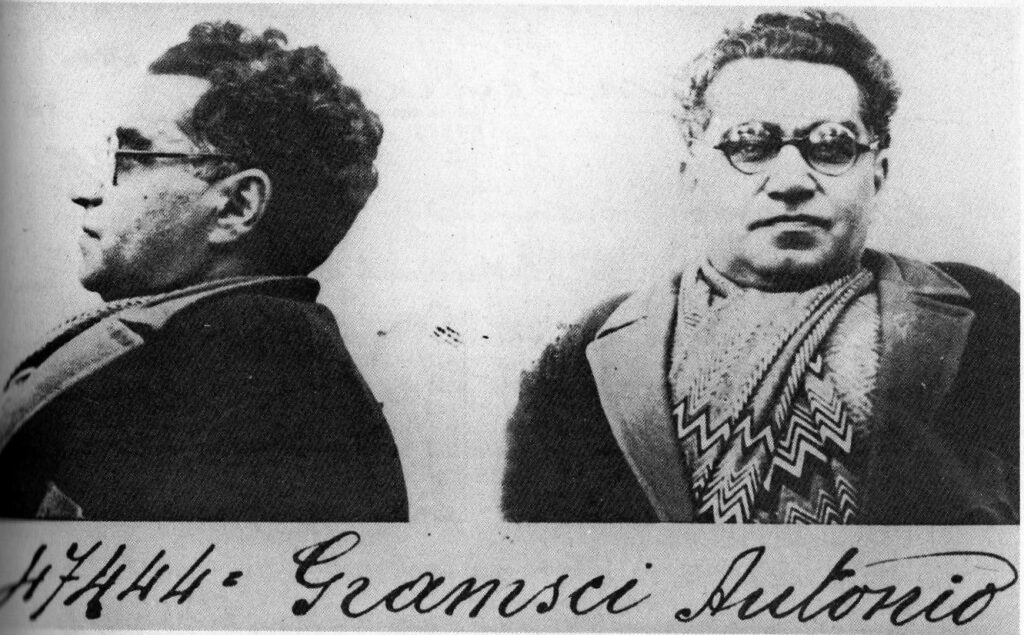
Articles
Gramsci’s laboratory: “subaltern social groups”. By Paul Hampton (Solidarity & Workers’ Liberty, Issue 699, 13 February 2024)
“Despite his fame, a considerable part of the writings of Antonio Gramsci, a leader of the Italian Communist Party in its revolutionary period of the early 1920s who then wrote Prison Notebooks in Mussolini’s jails, is not available in English.”
Michael Denning on Antonio Gramsci and hegemony (Jacobin, January 23, 2023)
Daniel Denvir interviews Michael Denning: “The great labor historian Michael Denning reflects on what Antonio Gramsci’s work has to tell us today.” See also part 2: Making sense of Antonio Gramsci (June 11, 2023).
The usable Gramsci. By Martin Thomas (Solidarity & Workers’ Liberty, Issue 633, 4 May 2022)
“The six recent contributions I will survey here mostly seek to identify an Antonio Gramsci usable for active socialist politics amidst the welter of Gramscis around us.”
How Antonio Gramsci’s ideas went global. By Marzia Maccaferri (Jacobin, November 1, 2021)
“Antonio Gramsci was twentieth-century Italy’s greatest intellectual. Fifty years ago, the English translation of Selections from the Prison Notebooks allowed his unorthodox Marxism to spread worldwide.”
The misuses of Gramsci (Weekly Worker, Issue 1336, 25 February 2021)
“Quoted by charlatans to provide an air of magic, praised for his ambiguities, more revered than read: David Broder calls for a serious engagement with a political strategy that still has considerable relevance.”
The conflict between Gramsci and Bordiga in the early days of the Italian Communist Party, and the Lyon Theses. By Roberto Sarti (In Defence of Marxism,
“This article explains the disagreements and political errors that marred the early years of the Communist Party of Italy (PCd’I). The Lyon Congress of 1926 was a culmination of the contradictory nature of the PCd’I …”
Gramsci, left populism and class struggle. By Rob Jackson (International Socialism, Issue 166, Spring 2020)
“I will argue that Chantal Mouffe fetters her project to extend and radicalise democracy by diverging from Gramsci’s politics of socialism from below.”
Antonio Gramsci: A Pedagogy to Change the World. By Anne Freeland (Marx & Philosophy Review of Books, 10 February 2020). Review of Nicola Pizzolato and John D Holst (eds)’s book (Springer, 2017, 248 p.)
“This volume brings together essays on the value of Antonio Gramsci’s thought for critical and revolutionary pedagogy.”
Happy birthday, Antonio Gramsci. By Lorenzo Alfano (Jacobin, January 22, 2020)
“Antonio Gramsci is remembered as a great theorist of modern politics and culture. But he didn’t think big ideas were just a matter for intellectuals — and he insisted that workers must become the leaders of their own organizations.”
The revolutionary ideas of Antonio Gramsci. By Alessandro Giardiello (In Defence of Marxism, 17 January 2020)
“Who was Gramsci? All manner of weird and wonderful answers have been given to this question, with plenty of distortions, if not outright historical falsifications, from petit-bourgeois academics and intellectuals, to revisionists in the labour movement.”
Antonio Gramsci and the Modern Prince. By Paul Le Blanc (Links: International Journal of Socialist Renewal, December 1, 2018)
“An examination of one of his best known works, ‘The Modern Prince’, highlights Gramsci as a theorist focused on practical revolutionary politics.”
Antonio Gramsci: Towards an Intellectual Biography. By Franco Manni (Marx & Philosophy Review of Books, 13 October 2018). Review of Alastair Davidson’s book (Haymarket Books, 2018, 344 p.)
“[The book] was originally published in 1976 and while this new edition does not contain any updated material, it comes with a new introduction in which the author claims the book to be the latest major English-language biography of Gramsci. Despite the title, it is not only an intellectual, but also a psychological, sociological and political biography.”
Morbid symptoms: What did Gramsci mean and how does it apply to our time? By Gilbert Achcar (International Socialist Review, Issue 108, Spring 2018)
“This article is based on a presentation given at an April 2017 conference on the eightieth anniversary of Antonio Gramsci’s death in Cagliari, Sardinia, organized by the Gramsci Institute, the University of Cagliari and Sassari, and the municipality of Cagliari.”
Between Como and confinement: Gramsci’s early Leninism (Marxist Left Review, No.14, Winter 2017)
“Rjurik Davidson examines Antonio Gramsci’s political practice in his early years.”
Antonio Gramsci: from war to revolution. By Stefanie Prezioso (New Politics: A Journal of Socialist Thought, Issue 63, Summer 2017, p.45-51)
“Despite this hijacking by his enemies, Gramsci’s thought continues to be among the richest and most stimulating Marxist intellectual contributions bequeathed to us from the early twentieth century and undoubtedly the most relevant today.”
The legacy of Antonio Gramsci (RS21: Revolutionary Socialism in the 21st Century, June 23, 2017)
“In this piece Gian Luigi Deiana discusses the life and legacy of Antonio Gramsci. He situates Gramsci within the work of the Casa Gramsci, and the question of popular sovereignty today.”
Gramsci and the Russian Revolution. By Alvaro Bianchi & Daniela Mussi (Jacobin: Reason in Revolt, 25 April 2017)
“What did a young Antonio Gramsci think about the Russian Revolution?”
Using Gramsci: A New Approach. By Piotr Stalmaszczyk (Marx & Philosophy Review of Books, 5 April 2017). Review of Michele Filippini’s book (Pluto Press, 2017, 174 p.)
“[The book] provides a concise and lucid guide to the Sardinian’s intellectual and practical toolkit.”
Antonio Gramsci. By John Holst (E-International Relations, March 14, 2017). Review of Mark McNally’s (ed.) book (Palgrave MacMillan, 2015, 247 p.)
“This book is a collection of chapters by established and renowned Gramscian scholars who have been at the center of Gramscian studies for a number of years.”
My Grandfather. By Antonio Gramsci, Jnr (New Left Review, Issue 102, November-December 2016)
“As the world of Soviet Communism disintegrates around him, a young Russian discovers the thought and moral example of the great Italian revolutionary who was his grandfather. Antonio Gramsci Jnr on his legacy, and the remarkable family of his grandmother, Giulia Schucht.”
The Revolutionary Marxism of Antonio Gramsci. By Sean Ledwith (Marx & Philosophy Review of Books, 9 November 2016). Review of Frank Rosengarten’s book (Haymarket, 2015, 196 p.)
“Rosengarten’s explicit purpose in this volume is to restore Gramsci to his rightful place in the revolutionary milieu of the Third International of the 1920s with its unwavering commitment to the necessity of a coercive toppling of the capitalist state.”
Trotsky and Gramsci on revolutionary strategy (Left Voice, September 15, 2016). Review of Emilio Albamonte and Mathias Maiello, Gramsci and Trotsky: Strategy for the Revolution in the West (Left Voice, 2016, 158 p.)
“Marxist historian Doug Greene discusses the main topics presented in a new book by two national leaders of the Partido de los Trabajadores Socialistas (PTS) … this book should be eagerly read by revolutionaries in preparation for the battles ahead.”
Antonio Gramsci: academic or revolutionary? By Bob Fotheringham (International Socialism, Issue 151, Summer 2016, p.214-216). Review of George Hoare and Nathan Sperber, An Introduction to Antonio Gramsci: His Life, Thought and Legacy (Bloomsbury, 2015, 272 p.)
“For a student … Hoare and Sperber’s book will prove a useful, though flawed, introduction. Those of us, on the other hand, interested in what Gramsci has to offer in understanding and changing the world as part of a revolutionary strategy will need to look elsewhere.”
Gramsci for communists. By Doug Enaa Greene (Links: International Journal for Socialist Renewal, June 22, 2015)
“Gramsci has been claimed by academics who spin out the latest in obstructionist ‘theory’ with no relation to revolution, Eurocommunists who need a ‘left’ cover for their revisionism, ex-radicals who think Gramsci’s ‘war of position’ means working within the US Democratic Party, and cultural critics who sneer at any and all forms of Marxism.”
The political development of Antonio Gramsci. By Joe Cleffie (International Socialist Review, Issue 98, Fall 2015). Review of Antonio Gramsci, A Great and Terrible World: The Pre-Prison Letters, 1908–1926, ed. David Boothman (Haymarket Books, 2014, 418 p.)
“While the book might be difficult to follow for readers new to Gramsci and the period it covers, it is an important resource to better understand the pre-prison Gramsci and the socialist movement of the time.”
See also review by Rob Jackson: Everything moves (International Socialism, Issue 149, Winter 2016) + by Chris Nineham: Gramsci the revolutionary, in his own words (Counterfire, March 12, 2015)
Gramsci and the party. By Murray Kane (Solidarity, Issue 268, 12 December 2012). Review of Martin Thomas, Antonio Gramsci: Working-Class Revolutionary: Esssays and Interviews (Workers’ Liberty, 2012, 76 p.).
“In five short essays, Martin Thomas expertly summarises a mass of historical material relating to Gramsci’s political life, including evidence for the relationship between Gramsci and Trotsky and about Gramsci’s thoughts on Stalinism.” Revised edition 2014, Gramsci in Context (140 p.)
See review by Adam David Morton: Gramsci, crisis, struggle (Solidarity, Issue 275, 20 February 2013) + Tony Abse: Debating Gramsci’s legacy (Solidarity, Issue 264, 14 November 2012).
Gramsci, Lenin, philosophy and the future of working-class politics. By Jelle Versieren (Solidarity, Issue 311, 19 January 2014)
Gramsci, Lenin and Western Marxism – The Modern Prince – The many Gramscis: Post-Marxism, contemporary philosophy and class politics ([Althusser]) – Post-Marxism – Anderson’s interpretation of Gramsci – Gramsci and philosophy.
Globalising Gramsci. By Adrian Budd (International Socialism, Issue 129, Winter 2011). Review of Alison J Ayers (ed), Gramsci, Political Economy and International Relations Theory (Palgrave Macmillan, 2008)
“Although, as is usually the case with edited volumes, the quality of the chapters is variable, most contain insights into key weaknesses of neo-Gramscian theory.”
Gramsci and Trotsky. By Martin Thomas (Solidarity, 3/211, 8 July 2011)
“Gramsci and Trotsky were both revolutionary Marxists. Yet Gramsci was not a Trotskyist, and Trotsky was not a Gramscian. What were their differences, and what can we learn from them?”
Gramsci’s Leninism (Counterfire, 22 June 2012)
“Chris Walsh explores Antonio Gramsci as a Leninist, the originality of his thinking and the relevance of Gramsci today.”
Gramsci is ours. By Paul Hampton (Workers Liberty, 3/182, 7 October 2010). Review of Antonio Santucci, Antonio Gramsci (Monthly Review Press, 2010, 176 p.) “[The book], so apparently seductive in its sophistication, is in fact just as hollow as the mountain of academic scribbling.”
See a more positive review by Phil Sharpe: Revolution as strategy (A World to Win, 22 July 2010).
The relevance of Gramsci’s theory for today. By Peter Latham (Links: International Journal of Socialist Renewal, January 3, 2010)
“This paper is based on the Gramsci section in my forthcoming book on The State and Local Government.
See more articles on Gramsci at Links.
Peter Thomas: Gramsci and us: building socialist hegemony today (Video, 11 May 2011)
The Gramscian Moment: Philosophy, Hegemony and Marxism. By Peter D. Thomas (Brill, Historical Materialism Book Series, 2009, 477 p.)
“This book draws on the rich recent season of Gramscian philological studies in order to argue that the true significance of Gramsci’s thought consists in its distinctive position in the development of the Marxist tradition.”
See reviews:
The revolutionary socialist as democratic philosopher. By Martin Thomas (Solidarity, 3/208, 15 June 2011)
Gramsci rendered whole. By Chris Bambery (International Socialism, Issue 127, Summer 2010)
Gramsci, hegemony and the united front. By Chris Nineham (Counterfire, 11 February 2010)
The revolutionary ideas of Antonio Gramsci. By Peter Thomas (Workers Liberty, 9 December 2009)
In the shadow of orthodox Trotskyism. By Joseph Choonara (International Socialism, Issue 122, Spring 2009). Review of Emanuele Saccarelli, Gramsci and Trotsky in the Shadow of Stalinism (Routledge, 2008)
“Books culled from doctoral theses are rarely page-turners but this work by unashamed Trotskyist Emanuele Saccarelli is better than most. Saccarelli attempts to rescue Antonio Gramsci and Leon Trotsky from the slander, misappropriation, distortion and, especially in Trotsky’s case, silencing that academia has subjected them to.”
Revolution and the party in Gramsci’s thought: A modern application. By Dan Jakopovich (International Viewpoint, Issue 406, November 2008)
“The central thread of this work is an evaluation of Antonio Gramsci’s fundamental contributions to the theory of revolutionary social transformation, particularly incorporating the role of the revolutionary party as the central institution of revolutionary conflict …”
Antonio Gramsci’s revolutionary legacy (International Socialism, Issue 114, Spring 2007)
“Antonio Gramsci is one of the most cited political thinkers of the 20th century. He is also one of the most misused. Thirty years ago socialists in favour of class conciliation treated him as their own; today ‘post-Marxist’ academics do the same. But Gramsci was a revolutionary with much to teach revolutionaries today.”
- Introduction (p.66)
- Gramsci: the Turin years, by Megan Trudell (p.67-83)
- Hegemony and revolutionary strategy, by Chris Bambery (p.85-103)
- Gramsci, the Prison Notebooks and philosophy, by Chris Harman (p.105-123)
- Gramsci’s Marxism and international relations, by Adrian Budd (p.125-135)
The state, consent and ‘war of position’. By Chris Bambery (Socialist Worker, Issue 1964, 20 August 2005). “The opening installment of our series on the Italian Marxist Antonio Gramsci.”
Part 2: A philosophy that reveals contradictions (Issue 1965, 27 August 2005)
Part 3: Class, ideology and revolution in the West (Issue 1966, 3 September 2005)
Trotsky and Gramsci: a posthumous dialogue. By Emilio Albamonte and Manolo Romano (Estrategia Internacional, No.19, 2003)
“In this article, we dwell on what we believe are the shortcomings in Gramsci’s views, but we are nevertheless aware that as much as Stalinism does not represent in the least a continuity with Bolshevism, but its counter-revolutionary degeneration, so current followers of Gramsci cannot claim to be his legitimate heirs.”
See also Permanent Revolution and the War of Position: the theory of revolution in Gramsci and Trotsky (ibid.)
Antonio Gramsci and C.L.R. James: some parallels and similarities. By
Frank Rosengarten (International Gramsci Society, August 2002)
“… a brief review of writing on James in which Gramscian terms and concepts play an important role. But before doing that, let me indicate a few of the themes in relation to which parallels and similarities between Gramsci and James are especially noteworthy.”
Gramsci and us (pdf). By Stuart Hall (Marxism Today, June 1987, p.16-21)
“How can questions raised by an Italian Communist in his wartime prison cell help us understand Thatcherism?”
The Gramsci-Trotsky Question (1922-1932) (pdf). By Frank Rosengarten (Social Text, No.11, Winter 1984-85, p.65-95; online at Academia.edu)
“I would argue, however, that a balanced view of Gramsci requires that we not only acknowledge his contribution to current “cultural radical” discourse, but that we also situate him unequivocally in the context of the revolutionary struggle to build a new society in accordance with the principles of Soviet socialist democracy.”
Gramsci versus Eurocommunism, Part 1. By Chris Harman (International Socialism, No.98, May 1977, p.23-26; at Marxists Intet Archive) + Part 2 (No.99, June 1977, p.10-14)
“In the first part of this article, Chris Harman rescued Gramsci’s thought from the distortions it has suffered at the hands of the Eurocommunists. In the second and final part he critically examines Gramsci’s strategy for revolution in Western Europe.”
Debate:
- Back to the Maginot Line: Harman’s new Gramsci. By Martin Shaw (International Socialism, No.1, July 1978, p.55-66)
- Forward from 1968 – or back to 1928? A reply to Martin Shaw. By Chris Harman (No.2, Autumn 1978, p.35-40)
The antinomies of Antonio Gramsci. By Perry Anderson (New Left Review, Issue 100, November 1976-January 1977, p.5-78). Only extracts online.
“Anderson … painstakingly reconstructs the shifting constellations of concepts used by Gramsci to theorize the differential nature of the state, civil society and class rule in East and West.”
In Swedish: Motsägelser hos Antonio Gramsci (pdf) (Marxistarkiv.se, august 2018, 90 s.). Med ett nytt 2017-förord av Anderson (s.2-16).
Antonio Gramsci and the Bolshevization of the PCI (Journal of Contemporary History, Vol.11, No.2, April 1976, p.15-13; online at Libcom.org)
“Thomas R. Bates on Gramsci’s role in the turn of the Italian Communist Party towards Bolshevik methods.”
Gramsci and Lenin 1917-1922. By Alastair Davidson (Socialist Register, 1974, p. 125-150)
“It seems from a historical reconstruction that the leninism which Gramsci knew before 1921, and accepted, was a ‘sovietist’ leninism (or, as critics would have it, a ‘syndicalist’ deviation) which stressed that a revolution is made from below by masses of men learning in the practice of organizing themselves for united action.”
Gramsci and Marxism. By V.G. Kiernan (Socialist Register, 1972, p.1-33)
“Antonio Gramsci … was, thanks to an intense absorption in and then forcible isolation from political life, a pioneer, the first outstanding one perhaps, of a new kind of Marxism or, more exactly, of fidelity in a new age to the spirit of early Marxism, enquiring and speculative as well as purposeful, truly catholic or world-embracing, after the great schism and the onset of its rigid disciplines.”
Theory and practice in Gramsci’s Marxism. By John Merrington (Socialist Register, 1968, p.145-176)
“Gramsci has recently been called ‘the theoretician of revolution in
the west’. Certainly it is true that no Marxist has confronted with
such lucidity the problem of organizing and sustaining a socialist movement
in the conditions of advanced capitalism.”
Litteratur på dansk
Carsten Jensen og Gert Sørensen (red.): Antonio Gramscis aktualitet (Books on Demand, 2020, 312 sider) (Gramsci Selskabets skriftserie, 1).
Anmeldelser:
Morten Thing: Gramscis levende tanker (Solidaritet.dk, 16. juli 2020)
Klaus Schulte: Gramsci lever – i den grad (Solidaritet.dk, 13. august 2020)
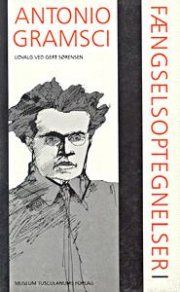
Anmeldelse:
Jan Helbak: Gramscis politiske skelet (Kritisk Debat, 15. august 2016). P.t. ikke online.
Gert Sørensen: Gramsci og ‘den moderne verden’: eller spørgsmålet om praxisfilosofiens autonomi (Museum Tusculanums Forlag, 1993, 520 sider)
Udgivet som tredje bind i en trilogi, hvor de to første er disse:
Antonio Gramsci: Fængselsoptegnelser i udvalg. 2 bind. Udgivet i oversættelse med indledning, kommentar og registre af Gert Sørensen
(Museum Tusculanums Forlag, 1991, 702 sider)
Anmeldelser:
Karsten Ditlevsen: Antonio Gramsci’s fængselsoptegnelser: En befriet marxisme (Giraffen, nr.5, 1991, s.26-28; online på Modkraft.dk)
Mette Moltke: Antonio Gramsci – hvad kan vi lære? (International Socialisme, nr.1, februar 1992, s.33-36; online på Socialister.dk)
Antonio Gramsci: Arbejderkontrol, arbejderråd, arbejderstyre. Udvalgt og oversat fra italiensk af Jørgen Stender Clausen (Rhodos, 1973, 293 sider) (Bibliotek Rhodos). Skrifter 1917-1926.
Antonio Gramsci: Politik og kultur: artikler, optegnelser og breve fra fængslet. Udvalgt og oversat fra italiensk af Kjeld Østerling Nielsen (Gyldendal, 1972, 211 sider) (Gyldendals Uglebøger). Skrifter 1916-1937. Side 86-109 (Fængselsoptegnelser: Bidrag til marxismens teori og historie) er online på Marxistisk Internet Arkiv: Dansk afdeling.
Claus Bryld: Politikeren Antonio Gramsci (Politisk Revy, nr.212, 1973, 5. januar 1973, s.7-10)
Debat: Gramsci mellem DKP og opposition (Politisk Revy, nr.217, 16. marts 1973):
Indhold:
Kjeld Østerling Nielsen: Claus Bryld og andedammen (s.19-20)
Claus Bryld: Til venstrefor centrum (s.20)
Kjeld Østerling Nielsen: Dialog om grænserne (s.21)
Claus Bryld: Forlagsvæsenet og producenterne (s.22)
Bruno Amoroso: Gramsci, kommunisterne og venstrefløjen (Politisk Revy, nr.221, 18. maj 1973, s.9-11)
Claus Bryld: Amoroso, Bordiga og Gramsci (Politisk Revy, nr.226, 31. august 1973, s.13-14). Med afsluttende kommentar fra redaktionen (s.14).
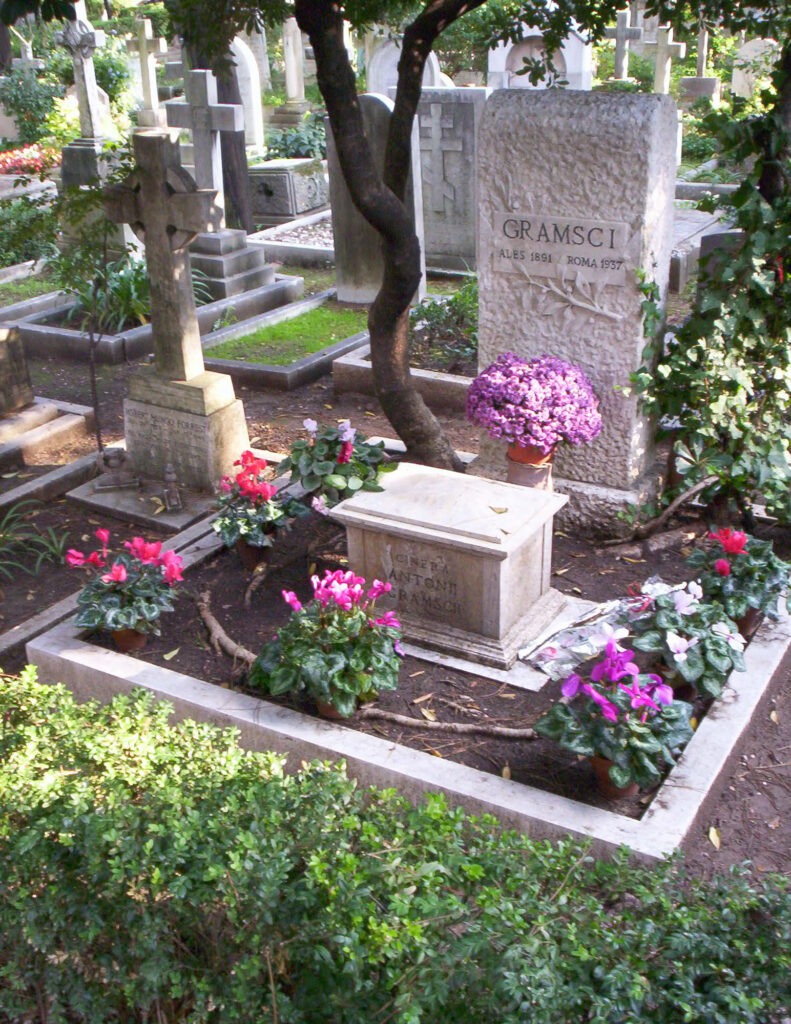
Se også på Socialistisk Bibliotek:
- Tidslinjen 13. juni 1889 om Amadeo Bordiga.
- Tidslinjen 26. marts 1893 om Palmiro Togliatti
- Tidslinjen 1. september 1920 om de italienske fabriksbesættelser.
- Tidslinjen 19. oktober 1922 om Benito Mussolini.
- Tidslinjen 21. januar 1926 om Lyon-teserne.
- Tidslinjen 4.-8. februar 1991 om PCIs opløsning til Demokratisk Venstreparti, PDS.
- Linkboxen om Fascisme og anti-fascisme (Socialistisk Bibliotek)






























